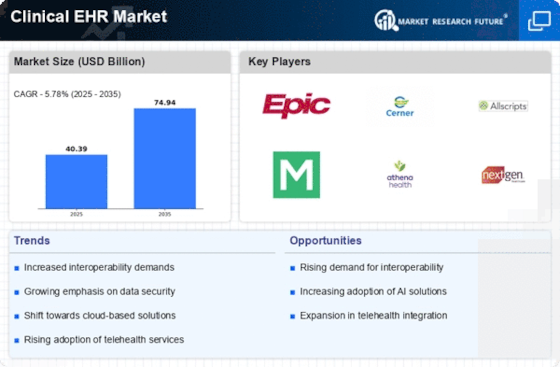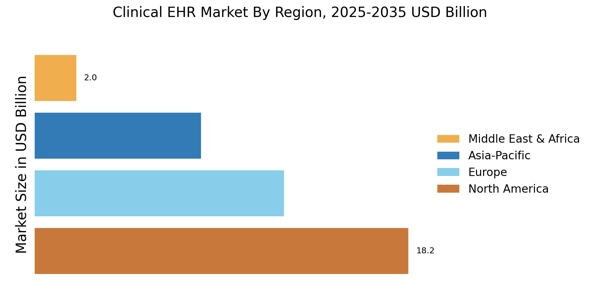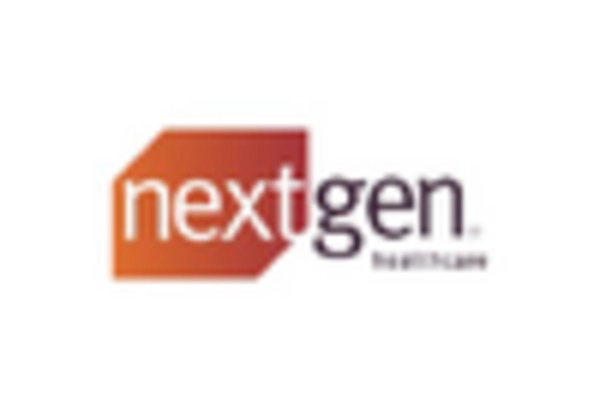Advancements in Data Analytics
The Clinical EHR Market is witnessing a transformative impact from advancements in data analytics. The ability to analyze vast amounts of patient data enables healthcare providers to derive actionable insights that can enhance clinical decision-making and operational efficiency. As of 2025, it is estimated that healthcare organizations utilizing advanced analytics within their EHR systems can improve patient outcomes by up to 30%. This capability allows for predictive modeling, risk stratification, and population health management, which are critical in today’s healthcare landscape. Consequently, the demand for Clinical EHR solutions that incorporate sophisticated data analytics tools is on the rise, as providers seek to leverage data for improved patient care and resource allocation.
Growing Focus on Patient-Centric Care
The Clinical EHR Market is increasingly oriented towards patient-centric care models. Healthcare providers are recognizing the importance of engaging patients in their own healthcare journeys, which necessitates the use of EHR systems that prioritize patient access to their health information. As of 2025, approximately 60% of patients express a desire to access their medical records online. This trend is prompting EHR vendors to enhance their platforms with features that allow patients to view lab results, schedule appointments, and communicate with providers. By fostering a more collaborative relationship between patients and healthcare professionals, Clinical EHR solutions are becoming essential tools in delivering personalized care and improving health outcomes.
Rising Demand for Telehealth Services
The Clinical EHR Market is experiencing a notable surge in demand for telehealth services. This trend is driven by the increasing acceptance of remote healthcare solutions, which allow patients to consult with healthcare providers from the comfort of their homes. As of 2025, it is estimated that telehealth services account for approximately 25% of all healthcare consultations. This shift necessitates the integration of robust EHR systems that can support virtual visits, manage patient data efficiently, and ensure compliance with regulatory standards. Consequently, healthcare organizations are investing in advanced Clinical EHR solutions that facilitate seamless telehealth interactions, thereby enhancing patient engagement and satisfaction.
Regulatory Compliance and Standardization
The Clinical EHR Market is significantly influenced by the need for regulatory compliance and standardization. Governments and health authorities are increasingly mandating the adoption of EHR systems that meet specific criteria for data management, privacy, and security. For instance, regulations such as the Health Insurance Portability and Accountability Act (HIPAA) in the United States require healthcare providers to implement stringent data protection measures. As of 2025, it is projected that compliance-related investments in EHR systems will exceed $10 billion annually. This regulatory landscape compels healthcare organizations to adopt Clinical EHR solutions that not only comply with existing regulations but also adapt to evolving standards, ensuring the integrity and confidentiality of patient information.
Increased Investment in Healthcare IT Infrastructure
The Clinical EHR Market is benefiting from increased investment in healthcare IT infrastructure. As healthcare organizations strive to modernize their operations, there is a growing recognition of the need for comprehensive EHR systems that can integrate with other health technologies. In 2025, it is projected that healthcare IT spending will reach $200 billion, with a significant portion allocated to EHR system upgrades and implementations. This investment is driven by the desire to enhance interoperability, streamline workflows, and improve patient data management. As a result, Clinical EHR solutions that offer scalable, flexible, and interoperable features are becoming increasingly attractive to healthcare providers looking to optimize their IT infrastructure.

















